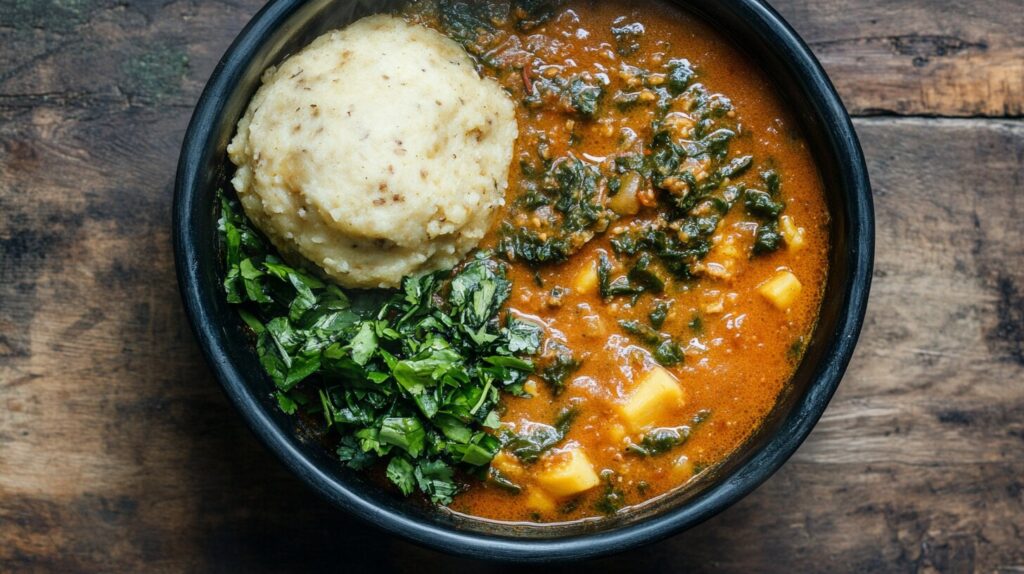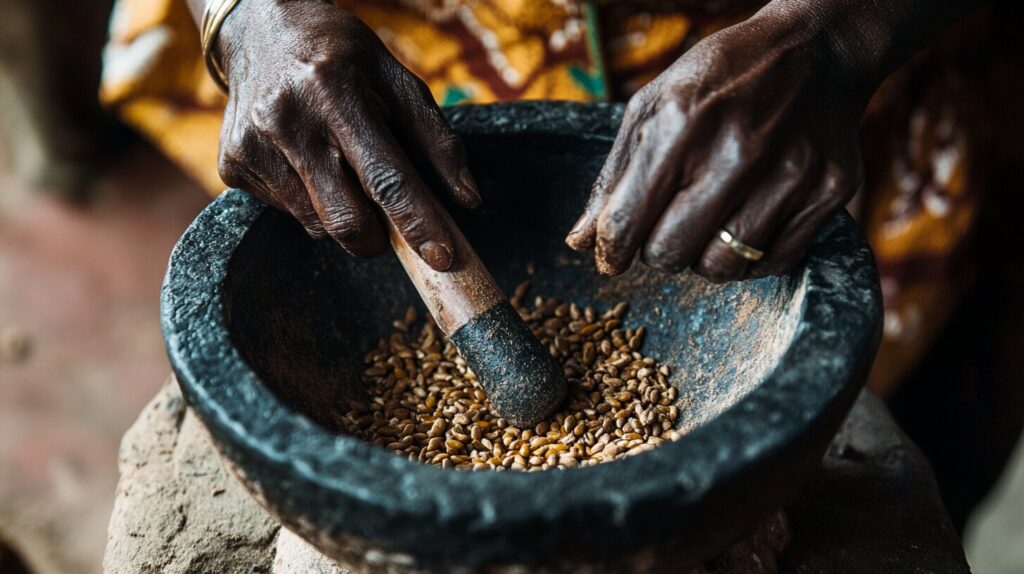
Table of Contents
Food serves as a powerful link to cultural identity, and exploring a dish’s origins helps us appreciate its significance and heritage. For example, one such beloved dish is egusi soup, a rich, flavorful West African delicacy. So, what ethnicity is egusi soup? This dish, cherished across Nigeria and neighboring countries, offers a glimpse into the traditions of several ethnic groups. To understand what ethnicity is egusi soup, we need to explore its cultural roots, preparation methods, and variations. By doing so, we gain a deeper appreciation of this iconic dish and the communities that treasure it.
Egusi Soup Ethnicity
When asking what ethnicity is egusi soup, the answer lies in the diverse ethnic groups of West Africa, particularly in Nigeria. The Yoruba, Igbo, and Efik people are closely associated with the creation and evolution of egusi soup. Each of these groups has added unique touches to the dish, reflecting their distinct culinary traditions. As a result, the dish showcases a beautiful blend of regional flavors Understanding what ethnicity is egusi soup helps us recognize the rich cultural fabric of West Africa and the shared culinary heritage that binds these communities together.
A Culinary Staple in West Africa
In West Africa, egusi soup is more than just a popular dish; it is a culinary staple that reflects the region’s agricultural practices and social customs. The soup’s ingredients are readily available and sourced from local farming traditions. Melon seeds, known as “egusi,” are highly nutritious and grow abundantly in the region’s climate. People often serve this dish with starchy sides like pounded yam, fufu, amala, or eba. Consequently, it becomes a filling and energy-rich meal.
Historical Background of Egusi Soup

Egusi soup has roots that go back centuries, influenced by the agricultural and culinary practices of West African societies. The primary ingredient, egusi (melon seeds), comes from the egusi melon, a plant that thrives in the region’s tropical climate. Historically, West African communities utilized every part of the melon, drying, grinding, and using the seeds as a thickening agent for soups and stews. The addition of leafy greens, palm oil, and proteins like fish or meat reflects the region’s abundant natural resources. Generations orally passed down the traditions surrounding egusi soup, preserving not just the recipe but also the stories, customs, and practices tied to the dish. Therefore, the dish carries a rich historical significance..
Ethnic Groups and Egusi Soup
To fully answer the question of what ethnicity is egusi soup, we need to look at the different communities that cherish it. The Yoruba people in southwestern Nigeria, the Igbo in the southeast, and the Efik and Ibibio in the south all prepare egusi soup with slight variations. When we explore the ethnicity of egusi soup, we see how each group incorporates local ingredients and traditional techniques. This diversity highlights the adaptability and enduring popularity of egusi soup across multiple ethnic groups.
The Meaning Behind the Name ‘Egusi’
The word “egusi” refers to the seeds of the melon plant, specifically those used in cooking across West Africa. If you’re curious about how fufu complements egusi soup, you can read more in “What is Fufu Made Of?”. The term varies slightly depending on the ethnic group and language. Among the Yoruba, the seeds are called “agushi,” while the Igbo refer to them as “egwusi” or “egusi.” The name itself encapsulates the significance of this ingredient in local diets. The egusi seeds are valued not only for their versatility but also for their nutritional content, being rich in protein and healthy fats. The linguistic roots of “egusi” reflect the shared agricultural knowledge and culinary traditions of different West African cultures, underscoring the importance of the dish.
Regional Variations of Egusi Soup
People prepare egusi soup differently across various regions of West Africa. In Nigeria, the Yoruba style typically includes leafy vegetables, assorted meats, and a generous amount of palm oil. The Igbo version may feature bitter leaves, which add a slightly tangy flavor. In Ghana, egusi soup (known locally as “agushie stew”) is often paired with yam or plantains. Similarly, the Efik and Ibibio people incorporate seafood for added flavor. The Efik and Ibibio people sometimes incorporate seafood and okra for a distinct texture. In Cameroon, the soup may be thinner and include ingredients like crayfish. These regional adaptations reflect the diversity of the people who cherish egusi soup, each adding their cultural touch to this delicious dish.
Egusi Soup in Yoruba Culture
For the Yoruba people of southwestern Nigeria, egusi soup is a treasured dish often prepared for special occasions and family gatherings. The Yoruba people typically cook the ground egusi seeds with vegetables like ugwu (pumpkin leaves) or spinach, and proteins like beef, goat meat, or dried fish. Spices like locust beans (iru) add depth of flavor. Egusi soup in Yoruba culture symbolizes warmth, hospitality, and tradition. In addition, it is often served with pounded yam or amala. The communal act of preparing and eating egusi soup reinforces family bonds and cultural heritage, making it an integral part of Yoruba identity.
Egusi Soup in Igbo Tradition
The Igbo people of southeastern Nigeria have their own cherished version of egusi soup. The dish often features bitter leaves (onugbu), which balance the rich, nutty flavor of the ground melon seeds. Alternatively, ugu (fluted pumpkin leaves) can be used for a milder taste. The Igbo preparation frequently includes proteins like goat meat, stockfish, or dried fish, enhancing the soup’s savory profile. Egusi soup is commonly served with fufu, pounded yam, or garri. In Igbo tradition, this dish is a symbol of prosperity, nourishment, and unity. It plays a key role in cultural festivals, weddings, and community gatherings, where food is a central part of the celebration.
Egusi Soup Among the Efik and Ibibio People
In Nigeria’s Cross River and Akwa Ibom states, the Efik and Ibibio people are renowned for their culinary expertise, and egusi soup is a staple in their cuisine. This version of egusi soup often includes a mix of seafood such as crabs, periwinkles, and prawns, alongside traditional meats. The Efik and Ibibio may also add okra to give the soup a slightly viscous texture. Rich in palm oil and aromatic spices, their egusi soup reflects the region’s coastal abundance and love for complex flavors. It is a dish that embodies both tradition and the natural wealth of the area, often served during festivals and family feasts.
Key Ingredients in Egusi Soup
Egusi soup’s rich flavors come from a combination of key ingredients that reflect the diverse agricultural resources of West Africa. The primary component, egusi seeds, consists of dried and ground melon seeds, which have a nutty taste and thickening properties. Other essential ingredients include palm oil, which imparts a deep red color and a distinctive taste, and leafy vegetables like fluted pumpkin leaves (ugwu), spinach, or bitter leaves. Proteins are a crucial part of the dish, often comprising beef, goat meat, chicken, dried fish, or crayfish. To enhance flavor, traditional seasonings such as locust beans (iru), onions, and pepper are used. Each ingredient plays a role in creating a harmonious and satisfying dish that resonates deeply with West African culinary traditions.
Traditional Preparation Methods
The preparation of egusi soup has been perfected over generations and reflects the essence of traditional West African cooking. The process begins by grinding the egusi seeds into a fine powder. The ground seeds are then mixed with water to form a paste or left dry for a crumblier texture. Palm oil is heated in a pot, and chopped onions, ground pepper, and optional locust beans are added to infuse the oil with flavor. The egusi paste is then spooned into the pot, creating a rich and thick base. Once the egusi has cooked for a few minutes, broth and proteins such as meat or fish are introduced. Finally, leafy vegetables like fluted pumpkin leaves or spinach are stirred in. The soup simmers until all the flavors meld, producing a dish that is hearty, aromatic, and deeply satisfying.
Symbolism and Significance
Egusi soup carries profound cultural significance in West African society, representing nourishment, heritage, and communal values. The dish often symbolizes prosperity and hospitality, as its preparation is generous and designed to be shared with loved ones. In many communities, serving egusi soup at gatherings signifies respect and unity, reinforcing social bonds. The inclusion of local ingredients like melon seeds, vegetables, and palm oil connects people to their land and traditions. Beyond its culinary importance, egusi soup embodies the resourcefulness and creativity of West African cuisine, where simple ingredients are transformed into a meal that is both nutritious and flavorful. Its enduring presence in homes and celebrations reflects the strength and continuity of cultural identity.
Egusi Soup in Festive Occasions

Egusi soup is a highlight of many festive occasions, serving as a centerpiece for celebrations such as weddings, naming ceremonies, and festivals. In Nigerian culture, it is a common dish during traditional Yoruba, Igbo, and Efik weddings, where it symbolizes abundance and joy. During holidays like Christmas and New Year, families cook large pots of egusi soup and share them with guests. The dish is also a staple at cultural festivals, where food plays a pivotal role in expressing heritage and unity. The preparation of egusi soup for such events often becomes a communal effort, with family members and friends contributing to the cooking process. This tradition fosters a sense of togetherness and reinforces the importance of food in marking life’s milestones.
Egusi Soup and Family Traditions
Egusi soup is deeply embedded in family traditions, often serving as a link between generations. In many West African households, the recipe for egusi soup is passed down from grandparents to parents and children, preserving both the method and the memories associated with the dish. Cooking egusi soup often involves storytelling, where elders share tales of their youth and family history. The preparation process itself is a bonding activity, with family members taking on different tasks — grinding the egusi seeds, chopping vegetables, or stirring the pot. The act of gathering around a shared meal of egusi soup reinforces values of love, respect, and unity. These family traditions ensure that the dish remains a cherished part of cultural identity.
Egusi Soup Beyond West Africa
The popularity of egusi soup has extended beyond West Africa, thanks to the African diaspora and globalization. For more insight into the nutritional benefits of West African dishes, check out “Is Fufu and Egusi Healthy?”, which explores their health value and preparation. In countries like the United States, the United Kingdom, and Canada, West African immigrants have introduced egusi soup to new audiences through restaurants, food festivals, and social media. African food markets in major cities now stock egusi seeds, palm oil, and traditional vegetables, making it easier for people to prepare the dish abroad. Additionally, food enthusiasts and chefs have embraced egusi soup, incorporating it into global culinary conversations. This international reach has helped raise awareness of West African cuisine, fostering a greater appreciation for its rich flavors and cultural significance. Egusi soup is now enjoyed by people from diverse backgrounds, further cementing its status as a culinary treasure.
Misconceptions About Egusi Soup
Despite its widespread popularity, egusi soup is sometimes misunderstood. One common misconception is that it is limited to a single ethnic group or region. In reality, egusi soup is cherished by multiple ethnic groups across Nigeria, Ghana, and Cameroon, each with its own variations. Another misunderstanding is that egusi soup is unhealthy due to its use of palm oil and meats. However, when prepared with balanced portions of vegetables and lean proteins, egusi soup is highly nutritious, offering healthy fats, protein, and vitamins. Some also mistakenly believe egusi seeds are the same as pumpkin seeds found in Western cuisines. While they share similarities, egusi seeds are unique to West Africa and have a distinct flavor and texture. Clarifying these misconceptions helps highlight the diversity and nutritional value of this beloved dish.
Health Benefits of Egusi Soup
Egusi soup is not only delicious but also packed with nutritional benefits. Ground egusi seeds provide protein, healthy fats, and essential vitamins, making the soup an excellent source of energy. The seeds contain omega-6 fatty acids, which support heart health, and they are high in antioxidants that help reduce inflammation. The addition of leafy vegetables like spinach or pumpkin leaves provides fiber, iron, and vitamins A and C, which are crucial for maintaining a healthy immune system. Palm oil, while sometimes criticized, offers vitamin E and carotenoids that are beneficial in moderation. When prepared with a variety of proteins, such as fish or lean meats, egusi soup becomes a well-rounded, nutrient-dense meal that supports overall well-being.
Modern Takes on Egusi Soup
In recent years, contemporary chefs and food enthusiasts have embraced egusi soup, adding creative twists to this traditional dish. Some chefs experiment by incorporating plant-based proteins like tofu or tempeh, making egusi soup suitable for vegetarian and vegan diets. For more inspiration, explore “The Ultimate Guide to Egusi Soup: A Timeless African Dish” to see traditional and modern variations of this beloved dish. Others substitute traditional meats with seafood or grilled chicken for a lighter version. Modern interpretations may also feature different vegetables, such as kale or collard greens, to provide new flavors and textures. Additionally, innovative techniques like using air fryers or slow cookers are being applied to simplify the cooking process. While these modern takes on egusi soup bring fresh ideas, they still respect the dish’s core ingredients and cultural roots, ensuring that tradition and innovation coexist harmoniously.
Egusi Soup vs. Other African Soups
Egusi soup is just one of many delicious soups in African cuisine, each with its unique flavors and preparation methods. For instance, Ogbono soup (made from wild mango seeds) shares a thick texture with egusi soup but has a more mucilaginous consistency. Efo Riro, a Yoruba vegetable soup, uses similar ingredients but omits the melon seeds, focusing more on leafy greens. Banga soup, popular among the Urhobo people, relies heavily on palm nut extract for its rich flavor. In Ghana, light soup is a spicy, broth-based dish that contrasts with the thicker, heartier egusi soup. While each of these soups represents different cultural traditions, they all share the fundamental West African principles of using fresh, local ingredients and communal preparation.
Egusi Soup in Popular Culture
Egusi soup has made its way into popular culture through movies, music, and social media, reflecting its importance in West African identity. In Nollywood films, characters often enjoy egusi soup during pivotal family scenes, emphasizing its role in everyday life and celebrations. Musicians and influencers frequently mention egusi soup in their content, celebrating it as a symbol of heritage and pride. The global popularity of social media platforms like YouTube and TikTok has further propelled egusi soup into the international spotlight, with cooking tutorials and “mukbang” videos showcasing the dish to millions of viewers. These representations not only celebrate West African cuisine but also educate global audiences about the rich cultural contexts behind traditional dishes like egusi soup.
Preserving the Authenticity of Egusi Soup
Understanding what ethnicity is egusi soup plays a crucial role in preserving its authenticity. As more people adopt modern lifestyles and fast-food culture, the risk of losing traditional preparation methods grows. However, many communities and culinary experts remain dedicated to keeping egusi soup true to its roots. When elders teach younger generations about the ethnicity of egusi soup, they ensure the dish maintains its cultural significance. These efforts help keep this culinary heritage alive for future generations.
How to Enjoy Egusi Soup
Egusi soup is best enjoyed with traditional West African staples that perfectly complement its rich, savory flavors. Popular options include pounded yam, fufu, eba (cassava flour), amala (yam flour), or semolina. These starchy sides help balance the soup’s rich texture and enhance its taste. To fully appreciate egusi soup, use your hands to roll the starch into small balls and dip them generously into the soup. This method, while traditional, also allows for a more immersive eating experience. Egusi soup can be enjoyed as a main dish for lunch or dinner and pairs wonderfully with a chilled beverage such as palm wine, zobo (hibiscus drink), or ginger beer. For those new to West African cuisine, egusi soup offers a delightful introduction to the region’s rich culinary traditions.
Egusi Soup Recipes to Try
Trying your hand at cooking egusi soup at home can be a rewarding experience. Here’s a simple, authentic recipe to get you started:
Ingredients:
- 1 cup ground egusi (melon) seeds
- 3 cups water or broth
- 3 tablespoons palm oil
- 1 pound assorted meats (beef, goat meat, or chicken)
- 2 cups chopped leafy greens (fluted pumpkin leaves, spinach, or kale)
- 1 cup stockfish or dried fish (optional)
- 1 medium onion, chopped
- 2 tablespoons ground crayfish
- 2 tablespoons ground pepper
- Salt to taste
- 2 tablespoons locust beans (optional)
Instructions:
- Season the meat with salt and pepper, then boil until tender. Set aside.
- Heat the palm oil in a pot and sauté the onions until fragrant.
- Add the ground egusi and stir continuously until the mixture becomes golden brown.
- Gradually pour in the broth or water and let it simmer until the egusi thickens.
- Add the boiled meats, stockfish, and crayfish. Allow to cook for 10 minutes.
- Stir in the leafy greens and locust beans. Simmer for another 5 minutes.
- Adjust the seasoning with salt and pepper to taste.
- Serve hot with pounded yam, fufu, or eba.
This simple recipe stays true to traditional flavors while being accessible for home cooks.
Conclusion
In conclusion, answering what ethnicity is egusi soup opens a window into the vibrant cultures of West Africa. The dish is more than just a meal; it reflects the traditions, values, and creativity of the Yoruba, Igbo, Efik, and other ethnic groups. By understanding what ethnicity is egusi soup, we celebrate a rich culinary heritage that transcends borders and unites people through shared flavors and stories. Generations have orally passed down the traditions surrounding egusi soup, preserving the recipe, stories, customs, and practices tied to the dish.. Ultimately, understanding its origins helps us celebrate the richness of West African cuisine.
FAQs
What is the origin of egusi soup?
Egusi soup originates from West Africa, particularly Nigeria, where it is enjoyed by various ethnic groups such as the Yoruba, Igbo, and Efik. It is also popular in other West African countries like Ghana and Cameroon.
What are egusi seeds?
Egusi seeds are the dried and ground seeds of certain melon varieties native to West Africa. They are known for their nutty flavor and high nutritional content, particularly protein and healthy fats.
Which ethnic groups eat egusi soup?
Egusi soup is commonly eaten by the Yoruba, Igbo, Efik, and Ibibio peoples of Nigeria. Variations of the dish are also enjoyed in Ghana, Cameroon, and other West African countries.
What can you eat with egusi soup?
Egusi soup is typically served with starchy sides like pounded yam, fufu, eba (cassava flour), amala, or semolina. These sides help balance the rich flavors and texture of the soup.
Is egusi soup healthy?
Yes, egusi soup is nutritious when prepared with balanced ingredients. The egusi seeds provide protein and healthy fats, while the leafy greens add fiber, vitamins, and minerals. Palm oil, when used in moderation, offers beneficial nutrients as well.
Can egusi soup be made vegan?
Absolutely! You can make a vegan version of egusi soup by using plant-based protein sources like mushrooms or tofu and omitting any meat or fish. The rich flavors of the egusi seeds and vegetables still make for a satisfying dish.
